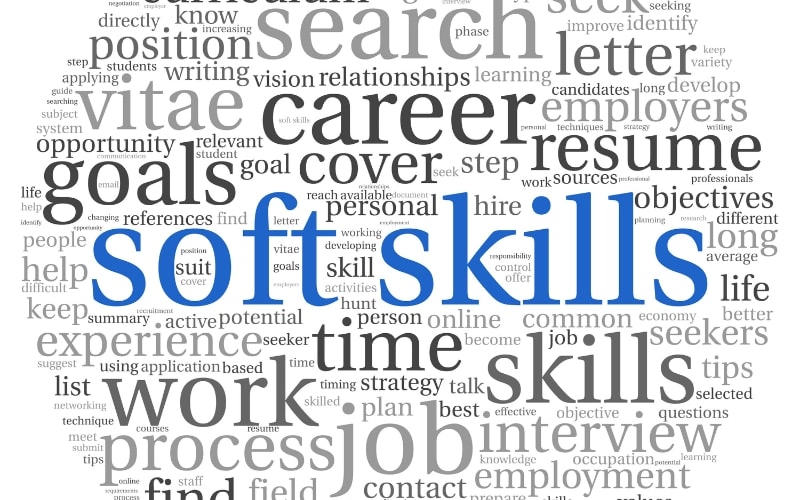In the ever-evolving landscape of manufacturing, the importance of soft skills has become increasingly evident. While technical expertise is crucial for operating machinery and managing production processes, The Role of Soft Skills in Manufacturing Hiring is paramount in fostering a productive and harmonious work environment. Soft skills such as communication, teamwork, problem-solving, and adaptability are essential for enhancing collaboration, streamlining operations, and driving efficiency, ultimately contributing to the overall success of the organization. This article explores the critical soft skills needed in manufacturing roles, methods for assessing these skills during the hiring process, their impact on manufacturing efficiency, and strategies for developing them within the workforce.
1.Introduction to Soft Skills in Manufacturing

In the ever-evolving landscape of manufacturing, the demand for highly skilled workers is as critical as ever. However, while technical proficiency remains paramount, there is a growing recognition of the Role of Soft Skills in this sector. Manufacturing hiring processes are increasingly focusing on these interpersonal abilities, which encompass a range of skills that facilitate effective communication, teamwork, problem-solving, and adaptability.
These soft skills are not only essential for individual performance but also for fostering a collaborative and productive work environment, making them a crucial consideration in manufacturing hiring decisions. As companies continue to prioritize the Role of Soft Skills in their recruitment strategies, understanding how to assess and develop these competencies within the workforce becomes vital. This article delves into the Role of Soft Skills in manufacturing hiring, highlighting their significance and the ways in which they can be effectively integrated into the hiring process.
The Importance of Soft Skills in Manufacturing
Soft skills are the bedrock of effective interaction and collaboration, especially in manufacturing hiring processes. In manufacturing, where teamwork and coordination are crucial, the Role of Soft Skills like clear communication, conflict resolution, and adaptability can significantly impact productivity and safety. Unlike technical skills, which are specific to tasks or equipment, soft skills are universally applicable, enhancing performance across various roles. Emphasizing the Role of Soft Skills in manufacturing hiring ensures a more cohesive and efficient workforce.
Communication Skills
Effective communication is vital in manufacturing hiring, where miscommunication can lead to costly errors and safety hazards. Understanding the Role of Soft Skills in these environments is crucial, as workers must be able to convey instructions, share feedback, and report issues succinctly and accurately. Good communication skills also facilitate better teamwork, as employees can more effectively collaborate on projects, share ideas, and support one another. Emphasizing the Role of Soft Skills during the manufacturing hiring process ensures that candidates can contribute to a safer and more efficient workplace.
Teamwork and Collaboration
Manufacturing often involves complex processes that require the coordinated efforts of multiple team members. In manufacturing hiring, recognizing the Role of Soft Skills is crucial, as the ability to work well in a team, understand different perspectives, and contribute to a shared goal is indispensable. Effective manufacturing hiring practices should emphasize these soft skills, as teamwork fosters a sense of camaraderie and collective responsibility, leading to more efficient problem-solving and innovation, which highlights the Role of Soft Skills in driving success.
Problem-Solving and Critical Thinking
Manufacturing environments are dynamic and can present unforeseen challenges. In manufacturing hiring, emphasizing the Role of Soft Skills is crucial, particularly problem-solving abilities. Workers equipped with these skills can think critically, analyze situations, and develop effective solutions quickly. This focus on the Role of Soft Skills in manufacturing hiring ensures that minor problems are addressed promptly, preventing them from escalating into major disruptions.
Adaptability and Flexibility
The manufacturing industry is subject to rapid technological advancements and shifting market demands. Recognizing the Role of Soft Skills in this context is crucial, as employees who are adaptable and open to change can more readily embrace new processes, technologies, and roles. Flexibility, a key soft skill, also enables workers to handle multiple tasks and responsibilities, making them more valuable to their employers in manufacturing hiring decisions. Emphasizing the Role of Soft Skills in manufacturing hiring ensures that companies are better prepared to navigate these evolving challenges.
Assessing Soft Skills During the Hiring Process
Given the importance of the Role of Soft Skills, it is crucial for manufacturing hiring managers to assess these abilities during the hiring process. Traditional interviews may not be sufficient to gauge a candidate’s soft skills accurately. Instead, employers involved in manufacturing hiring can utilize behavioral interview questions, situational judgment tests, and personality assessments to evaluate these competencies, ensuring that the Role of Soft Skills is thoroughly considered.
Behavioral Interview Questions
Behavioral questions ask candidates to provide examples of how they have demonstrated specific soft skills in past situations, emphasizing the Role of Soft Skills in successful job performance. For instance, asking about a time when they had to resolve a conflict or adapt to a significant change can provide insights into their interpersonal abilities and flexibility, which are crucial in manufacturing hiring. Understanding the Role of Soft Skills is vital for manufacturing hiring to ensure candidates can navigate challenges effectively.
Situational Judgement Tests
These tests present hypothetical scenarios relevant to the job and ask candidates to choose or rank the best responses. This method helps assess how candidates might handle real-life situations that require soft skills such as problem-solving and communication.
Personality Assessments
Personality assessments, such as the Myers-Briggs Type Indicator (MBTI) or the Big Five personality traits, can offer valuable information about a candidate’s natural tendencies and interpersonal style. These tools can help predict how well a candidate might fit into a team-oriented and dynamic manufacturing environment.
2. Critical Soft Skills for Manufacturing Roles

In the manufacturing industry, technical expertise is undeniably important. However, the significance of soft skills cannot be overlooked. These interpersonal attributes and personal qualities are essential for ensuring smooth operations, effective teamwork, and a productive work environment. This article explores the critical soft skills that are indispensable for manufacturing roles and highlights why they are crucial for the industry’s success.
Communication Skills
Effective communication is at the core of any successful manufacturing operation. Clear and concise communication ensures that instructions are understood, feedback is appropriately given, and safety protocols are followed. In a manufacturing setting, miscommunication can lead to errors, accidents, and decreased efficiency. Therefore, workers must be adept at both verbal and written communication.
For example, a machine operator needs to accurately report issues or anomalies to maintenance staff to prevent equipment failures. Similarly, team leaders must communicate production goals and updates to their teams effectively. Good communication skills also facilitate better relationships among coworkers, fostering a collaborative and supportive work environment.
Teamwork and Collaboration
Manufacturing is often a team effort, requiring the coordinated actions of many individuals to produce a final product. The ability to work well with others, understand different perspectives, and contribute to a common goal is essential. Effective teamwork leads to increased efficiency, innovation, and problem-solving.
Employees who excel in teamwork are usually good listeners, empathetic, and respectful of their colleagues’ ideas and contributions. For instance, in an assembly line, each worker’s role is interconnected. If one person struggles, it can impact the entire line. Hence, team members must support each other and work cohesively to meet production targets and maintain quality standards.
Problem-Solving and Critical Thinking
Manufacturing environments are dynamic and often present unexpected challenges. Employees with strong problem-solving skills can analyze situations, identify root causes, and develop effective solutions quickly. This ability is crucial for minimizing downtime, reducing waste, and maintaining productivity.
For example, a maintenance technician encountering a malfunctioning machine must diagnose the issue and decide the best course of action to fix it swiftly. Similarly, production managers often face logistical challenges that require innovative thinking and quick decision-making. Critical thinking and problem-solving skills enable employees to address these issues efficiently, preventing minor problems from escalating into major disruptions.
Adaptability and Flexibility
The manufacturing industry is continuously evolving due to advancements in technology, changes in consumer demand, and new regulatory requirements. Employees who are adaptable and flexible can more easily embrace these changes and thrive in a dynamic work environment.
Adaptability involves being open to new ideas, learning new skills, and adjusting to changing circumstances. For example, a worker might need to learn to operate a new piece of machinery or adapt to a new production process. Flexibility also means being willing to take on different roles or responsibilities as needed, making the workforce more versatile and resilient.
Leadership and Initiative
Leadership is not confined to managerial roles; it is a valuable trait at all levels of the manufacturing workforce. Employees who demonstrate leadership take initiative, motivate their peers, and contribute to a positive workplace culture. They are proactive in identifying areas for improvement and implementing changes that enhance productivity and safety.
For instance, a team member who notices a recurring issue on the production line might take the initiative to propose a new procedure or tool to resolve it. Leadership skills also involve mentoring and supporting colleagues, which helps build a more competent and cohesive team.
3. Problem-Solving and Critical Thinking in Manufacturing Hiring

In the dynamic world of manufacturing, the ability to solve problems and think critically is not just an asset but a necessity. Manufacturing environments are complex, with various processes, equipment, and human factors interacting in intricate ways. When unforeseen issues arise, the capacity to analyze, diagnose, and address these problems efficiently can make the difference between seamless operation and costly downtime. This article delves into the significance of problem-solving and critical thinking in manufacturing hiring, outlining how these skills can be identified and cultivated within the workforce.
The Significance of Problem-Solving and Critical Thinking
Manufacturing settings are prone to challenges that require immediate and effective solutions. From machine malfunctions and quality control issues to supply chain disruptions and workflow inefficiencies, the spectrum of potential problems is broad. Problem-solving skills enable workers to identify the root cause of an issue, develop a viable solution, and implement it swiftly. This reduces downtime, minimizes waste, and maintains productivity.
Critical thinking goes hand-in-hand with problem-solving. It involves the ability to evaluate information objectively, make reasoned judgments, and foresee potential complications. In manufacturing, critical thinkers can anticipate problems before they arise and develop proactive strategies to mitigate them. This forward-thinking approach is essential for maintaining a smooth and efficient production process.
Identifying Problem-Solving and Critical Thinking Skills in Candidates
During the hiring process, it is crucial to assess a candidate’s problem-solving and critical thinking abilities. Traditional interviews may not always reveal these skills, so employing more targeted evaluation methods can be beneficial.
Behavioral Interview Questions
Behavioral questions are designed to elicit responses that demonstrate a candidate’s past experiences and problem-solving capabilities. For example, asking a candidate to describe a time when they had to troubleshoot a complex issue can provide insights into their analytical and critical thinking skills. Questions like, “Can you walk me through a situation where you identified a problem and implemented a solution?” help reveal how candidates approach and resolve issues.
Situational Judgement Tests
These tests present hypothetical scenarios that candidates might encounter in a manufacturing environment and ask them to choose or rank the best course of action. This method assesses how candidates would apply their problem-solving and critical thinking skills in real-life situations. It provides a glimpse into their decision-making process and their ability to handle pressure and complexity.
Technical Assessments and Simulations
Technical assessments or practical simulations can also be effective in evaluating problem-solving skills. Candidates can be asked to solve industry-specific problems or perform tasks that require critical thinking. For example, a simulation might involve diagnosing and fixing a simulated equipment malfunction, allowing the candidate to demonstrate their technical and analytical abilities in a controlled setting.
Cultivating Problem-Solving and Critical Thinking in the Workforce
Once hired, it is essential to continue developing these skills among employees. Continuous training and development programs can help nurture and enhance problem-solving and critical thinking abilities.
Training Programs
Regular training sessions focused on problem-solving techniques and critical thinking exercises can help employees sharpen these skills. Workshops that involve case studies, role-playing, and real-world problem scenarios can be particularly effective. These programs should encourage employees to think creatively and collaboratively to find innovative solutions.
Mentorship and Coaching
Pairing less experienced employees with seasoned mentors can facilitate knowledge transfer and skill development. Mentors can provide guidance, share best practices, and offer support in navigating complex problems. This hands-on learning approach helps employees build confidence and competence in their problem-solving abilities.
Encouraging a Problem-Solving Culture
Fostering a workplace culture that values and rewards problem-solving and critical thinking is vital. Encouraging employees to take initiative, share ideas, and collaborate on solutions creates an environment where these skills can flourish. Recognizing and celebrating successes in problem-solving can motivate employees to continually improve and innovate.
4. The Impact of Soft Skills on Manufacturing Efficiency

In the manufacturing industry, efficiency is paramount. It is the key to maintaining productivity, ensuring quality, and ultimately, driving profitability. While technical skills and knowledge of machinery are critical, the importance of soft skills in achieving and sustaining manufacturing efficiency cannot be overstated. Soft skills, such as communication, teamwork, problem-solving, and adaptability, play a vital role in streamlining operations, fostering a positive work environment, and enhancing overall productivity.
Communication: The Backbone of Efficiency
Effective communication is the cornerstone of any successful manufacturing operation. Clear and concise communication ensures that instructions are understood, feedback is properly conveyed, and safety protocols are adhered to. In a manufacturing setting, miscommunication can lead to costly errors, production delays, and safety incidents.
For instance, a machine operator who can accurately report a malfunction to the maintenance team helps minimize downtime. Similarly, when team leaders communicate production goals and updates effectively, it aligns the entire team towards common objectives. Good communication skills also facilitate better collaboration among coworkers, leading to smoother workflows and quicker resolution of issues.
Teamwork: Enhancing Collaboration and Productivity
Manufacturing is a collaborative effort that relies heavily on teamwork. The ability to work well with others, understand different perspectives, and contribute to a common goal is essential for maintaining high levels of efficiency. Effective teamwork leads to improved coordination, innovation, and problem-solving capabilities.
In an assembly line, each worker’s role is interconnected. If one person struggles, it can affect the entire production process. Therefore, team members must support each other, share knowledge, and work cohesively to meet production targets and maintain quality standards. Employees who excel in teamwork are typically good listeners, empathetic, and respectful of their colleagues’ ideas and contributions, creating a harmonious and efficient work environment.
Problem-Solving: Addressing Issues Proactively
Manufacturing environments are dynamic and often present unforeseen challenges. Workers equipped with strong problem-solving skills can think critically, analyze situations, and develop effective solutions quickly. This ability to troubleshoot and address issues promptly is crucial for minimizing downtime, reducing waste, and maintaining productivity.
For example, a maintenance technician encountering a malfunctioning machine must diagnose the issue and decide the best course of action to fix it swiftly. Production managers often face logistical challenges that require innovative thinking and quick decision-making. Problem-solving skills enable employees to address these issues efficiently, preventing minor problems from escalating into major disruptions.
Adaptability: Navigating Change with Ease
The manufacturing industry is continuously evolving due to advancements in technology, changes in consumer demand, and new regulatory requirements. Employees who are adaptable and flexible can more easily embrace these changes and thrive in a dynamic work environment. Adaptability involves being open to new ideas, learning new skills, and adjusting to changing circumstances.
For example, a worker might need to learn to operate a new piece of machinery or adapt to a new production process. Flexibility also means being willing to take on different roles or responsibilities as needed, making the workforce more versatile and resilient. This adaptability helps companies remain competitive and responsive to market demands, ultimately enhancing efficiency.
Real-World Examples of Soft Skills Boosting Efficiency
There are numerous real-world examples of how soft skills contribute to manufacturing efficiency. In one case, a manufacturing company facing high turnover rates implemented team-building activities and communication training for its employees. As a result, teamwork improved, employee satisfaction increased, and turnover rates dropped, leading to a more stable and productive workforce.
In another instance, a company invested in problem-solving workshops for its staff. Employees were encouraged to identify bottlenecks and propose solutions. This initiative led to several process improvements, reducing production time and costs significantly. By fostering a culture that values soft skills, these companies were able to enhance their operational efficiency and achieve better outcomes.
5. Strategies for Developing Soft Skills in the Workforce

In today’s manufacturing industry, soft skills are just as crucial as technical know-how. While hard skills enable employees to operate machinery and perform tasks efficiently, soft skills such as communication, teamwork, problem-solving, and adaptability are vital for fostering a cohesive and productive work environment. Developing these skills within the workforce is essential for maximizing efficiency, improving employee morale, and driving overall organizational success. Here are some effective strategies for cultivating soft skills in the manufacturing workforce.
Implement Comprehensive Training Programs
One of the most effective ways to develop soft skills in employees is through comprehensive training programs. These programs should be tailored to address the specific needs of the manufacturing environment and should cover a range of soft skills. Workshops and seminars focusing on communication techniques, teamwork exercises, and problem-solving strategies can provide employees with practical tools they can apply in their daily work.
For example, a workshop on communication skills might include role-playing exercises where employees practice giving and receiving feedback. A teamwork seminar could involve collaborative projects that require team members to work together to achieve a common goal. By participating in these training programs, employees can develop a better understanding of how to interact effectively with their colleagues and contribute to a more harmonious and efficient workplace.
Encourage Mentorship and Coaching
Mentorship and coaching are powerful tools for developing soft skills in the workforce. Pairing less experienced employees with seasoned mentors provides them with the opportunity to learn from those who have already mastered the soft skills required in a manufacturing setting. Mentors can offer guidance, share best practices, and provide feedback on areas for improvement.
For instance, a mentor can help a mentee develop better problem-solving skills by discussing past challenges they have faced and how they resolved them. This hands-on learning approach allows mentees to gain valuable insights and apply them in their own work. Additionally, regular coaching sessions can help employees set goals for developing their soft skills and track their progress over time.
Foster a Collaborative Work Environment
Creating a collaborative work environment is essential for promoting soft skills development. When employees are encouraged to work together and support each other, they naturally develop better communication and teamwork skills. Management can facilitate collaboration by organizing team-building activities, encouraging open communication, and promoting a culture of mutual respect and support.
Team-building activities such as group projects, team outings, and collaborative problem-solving sessions can help strengthen bonds among employees and improve their ability to work together. Encouraging open communication through regular team meetings and feedback sessions allows employees to share ideas, discuss challenges, and collaborate on solutions. By fostering a collaborative work environment, companies can create a more engaged and cohesive workforce.
Provide Continuous Learning Opportunities
Soft skills development should be an ongoing process. Providing continuous learning opportunities for employees ensures they are constantly improving and adapting to new challenges. This can be achieved through a variety of methods, such as online courses, webinars, and access to educational resources.
Offering online courses on topics like conflict resolution, leadership, and emotional intelligence allows employees to learn at their own pace and apply new skills in their work. Webinars and workshops led by industry experts can provide employees with fresh perspectives and insights into best practices for soft skills development. By investing in continuous learning, companies can ensure their workforce remains adaptable and capable of meeting the demands of an ever-changing manufacturing environment.
Recognize and Reward Soft Skills Development
Recognizing and rewarding employees for their efforts in developing soft skills is crucial for motivating and encouraging continuous improvement. Acknowledging employees who demonstrate strong communication, teamwork, or problem-solving skills reinforces the importance of these attributes and encourages others to follow suit.
This recognition can take various forms, such as employee of the month awards, public acknowledgment in team meetings, or even financial incentives. By celebrating successes and highlighting the impact of soft skills on overall performance, companies can create a culture that values and prioritizes soft skills development.
Conclusion
In conclusion, soft skills are indispensable in the manufacturing industry, complementing technical abilities and enhancing overall operational efficiency. Effective communication, teamwork, problem-solving, and adaptability not only improve individual performance but also foster a cohesive and productive work environment. By prioritizing the development and integration of these skills through comprehensive training programs, mentorship, continuous learning opportunities, and a supportive culture, manufacturing companies can create a resilient and efficient workforce. Investing in soft skills development is essential for navigating the complexities of the industry, driving innovation, and achieving long-term success. Read about Strategies for Efficient Workforce Management in Manufacturing.


